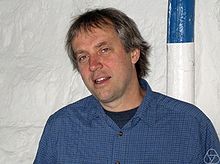Dave Bayer
David Bayer | |
|---|---|
 Dave Bayer in 2006 (photo from MFO) | |
| Born | November 29, 1955 (age 66) |
| Alma mater | Harvard University |
| Scientific career | |
| Fields | mathematics, film |
| Institutions | Columbia University |
| Doctoral advisor | Heisuke Hironaka |
David Allen Bayer (born November 29, 1955) is an American mathematician known for his contributions in algebra and symbolic computation and for his consulting work in the movie industry. He is a professor of mathematics at Barnard College, Columbia University.
Education and career[]
Bayer was educated at Swarthmore College as an undergraduate, where he attended a course on combinatorial algorithms given by Herbert Wilf. During that semester, Bayer related several original ideas to Wilf on the subject. These contributions were later incorporated into the second edition of Wilf and Albert Nijenhuis' influential book Combinatorial Algorithms, with a detailed acknowledgement by its authors.[1] Bayer subsequently earned his PhD at Harvard University in 1982 under the direction of Heisuke Hironaka with a dissertation entitled The Division Algorithm and the Hilbert Scheme. He joined Columbia University thereafter.
Bayer is the son of Bryce Bayer, the inventor of the Bayer filter.[2]
Contributions[]
Bayer has worked in various areas of algebra and symbolic computation, including Hilbert functions, Betti numbers, and linear programming. He has written a number of highly cited papers in these areas with other notable mathematicians, including Bernd Sturmfels, Jeffrey Lagarias, Persi Diaconis, Irena Peeva, and David Eisenbud.
Consulting[]
Bayer was a mathematics consultant for the film A Beautiful Mind, the biopic of John Nash, and also had a cameo as one of the "Pen Ceremony" professors.[3]
References[]
- ^ A Nijenhuis and HS Wilf (1978) Combinatorial Algorithms, 2nd ed., Academic Press.
- ^ https://www.nytimes.com/2012/11/29/business/bryce-bayer-inventor-of-a-filter-to-make-color-digital-pictures-dies-at-83.html
- ^ B Polster and M Ross (2012) Math Goes to the Movies, Johns Hopkins University Press.
External links[]
- Living people
- 20th-century American mathematicians
- 21st-century American mathematicians
- Swarthmore College alumni
- Harvard University alumni
- Barnard College faculty
- 1955 births
- Mathematicians from New York (state)